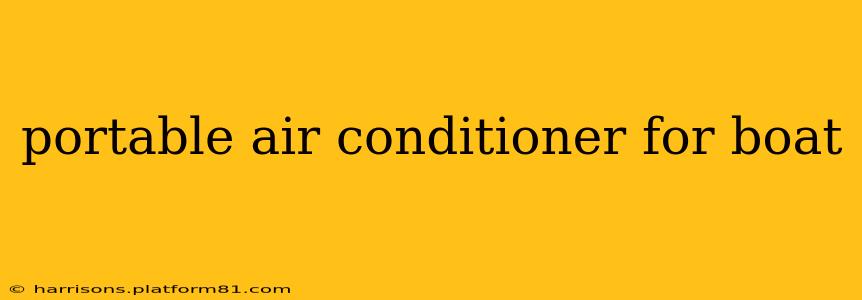Choosing the right portable air conditioner for your boat can significantly enhance your on-water experience, transforming sweltering summer days into comfortable cruises. But with so many options available, finding the perfect fit can feel overwhelming. This guide delves into the essential factors to consider when selecting a boat air conditioner, helping you make an informed decision and enjoy cooler, more comfortable days on the water.
What Size Portable Air Conditioner Do I Need for My Boat?
Determining the correct BTU (British Thermal Unit) rating is crucial. BTU output dictates the cooling capacity of the unit. Underestimating the required BTU will result in inadequate cooling, while overestimating might lead to unnecessary expense and potentially strain your boat's electrical system. Consider the size of the space you need to cool, the number of windows and doors, and the level of insulation. Manufacturers often provide BTU guidelines based on square footage, but remember that boats present unique challenges due to their construction and exposure to the elements. It's always best to err on the side of slightly higher BTU capacity to ensure effective cooling.
Can You Put a Regular Portable AC Unit on a Boat?
While standard portable air conditioners can technically be placed on a boat, it's generally not recommended without careful consideration and modifications. Regular portable AC units are designed for land-based applications and often lack the necessary features for a marine environment. These units may not be adequately sealed against moisture, making them susceptible to damage from saltwater spray or humidity. Furthermore, the power requirements might exceed your boat's capacity, and the ventilation system might not be efficient enough to handle the confined space of a boat. Dedicated marine-grade AC units are designed to withstand the harsh conditions and offer superior protection against water damage.
How Much Power Does a Portable Boat Air Conditioner Use?
Portable boat air conditioners come in various power consumption levels. The power draw is directly related to the BTU rating – higher BTU units consume more power. Before purchasing, carefully check the power requirements (usually measured in amps or watts) and compare them to your boat's electrical system capacity. Using a unit that draws excessive power can overload the system, potentially damaging your boat's electrical components or even leading to a power outage. Consider the duration of your boating trips and plan accordingly to manage power consumption. Investing in a unit with energy-efficient features can help minimize power usage.
What are the Best Portable Air Conditioners for Boats?
There isn't a single "best" portable air conditioner for all boats. The optimal choice depends on your boat's size, power system, and your specific cooling needs. However, many reputable marine supply companies offer high-quality, durable, and efficient portable air conditioning units designed specifically for boats. Researching reviews and specifications from various brands will assist in making the best decision for your situation. Always prioritize units that are specifically designed for marine applications and built to withstand the harsh environment.
Are Portable Air Conditioners for Boats Worth It?
For many boat owners, especially those who use their boats extensively during hot weather, a portable air conditioner offers an invaluable upgrade. The comfort and improved experience gained from a cool interior are often considered well worth the investment. However, the cost of the unit, its power consumption, and the need for adequate electrical capacity must be weighed against the benefits. Consider the frequency and duration of your boating trips, and how much time you spend on board. If your usage justifies the expense and the installation is feasible, a portable boat air conditioner can significantly enhance your boating enjoyment.
How Do I Install a Portable Air Conditioner in My Boat?
Installing a portable boat air conditioner may vary depending on the specific model and your boat's design. However, many units are designed for relatively easy installation and require minimal modifications. Consult the manufacturer's instructions for specific installation guidance. Proper ventilation is paramount, and you might need to create or adapt existing vents to accommodate the air conditioner's exhaust. Remember to ensure the unit is securely mounted to prevent movement during operation. If you are unsure about any aspect of the installation, it’s recommended to seek assistance from a qualified marine technician.
This comprehensive guide provides a solid foundation for choosing the right portable air conditioner for your boat. Remember to carefully assess your boat's specifics and prioritize safety and compatibility when making your selection. Happy boating!
